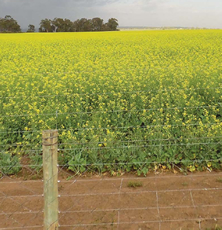Magical Canola
 The striking colourful flowers resembling a rolled out yellow carpet create a rare spectacle on a farm. This exotic plant which can grow up to four feet with a maturity period of between 75 and 90 days can easily be mistaken for an overgrown kale plant. Though not relatively new in Kenya, canola crop is fast gaining popularity among farmers, both large and small scale. Majority of those who have embraced the crop are doing so for purposes of selling the seeds for production of cooking oil. The by-product is a much sought commodity by dairy farmers. What remains after the oil has been extracted from the canola seeds is fodder rich in proteins. Its scarcity in the country has seen dairy farmers import the product from Tanzania to supplement the protein diet for their cows.
The striking colourful flowers resembling a rolled out yellow carpet create a rare spectacle on a farm. This exotic plant which can grow up to four feet with a maturity period of between 75 and 90 days can easily be mistaken for an overgrown kale plant. Though not relatively new in Kenya, canola crop is fast gaining popularity among farmers, both large and small scale. Majority of those who have embraced the crop are doing so for purposes of selling the seeds for production of cooking oil. The by-product is a much sought commodity by dairy farmers. What remains after the oil has been extracted from the canola seeds is fodder rich in proteins. Its scarcity in the country has seen dairy farmers import the product from Tanzania to supplement the protein diet for their cows.
But while many of the growers are aware of the benefits of this crop which traces its origin to Canada, few of the farmers are yet to fully appreciate its weed and disease controlling capability especially on cereal crops. Growing canola as a rotational crop could resort to a farmer saying goodbye to disease such as fusarium and pythium which are known to cause heavy losses in barley and wheat. Experts now say using canola as a rotational crop reduces close to 100 percent of all post-harvest losses associated with cereal crop diseases. They suggest that a lot of the root diseases affecting wheat and barley can easily be avoided especially if farmers moved away from mono-cropping.
As a commercial crop, canola is earning farmers good income as its demand continues to soar across the farming community as well as cooking oil processors. Mr. David Kimondo who is credited with introducing canola farming among Nyeri’s smalls scale farmers in 2011 found out that the demand for canola seeds was high such that farmers are placing orders when the crop is still growing in the fields. About 50 farmers mainly from Kieni sub-county of Nyeri were the early raisers. A kilo of seeds vary from the variety and an acre requires four kilos with an expected harvest of two tones.
While the small scale farmers continue to enjoy huge returns from the investment, they are yet to realize the additional benefit their counterparts in other regions of the country are reaping.
Use of canola crop especially among wheat and barley large scale farmers has shown reduced crop losses during harvest seasons. Farmers who have practiced rotational cropping with canola as well as experts say they have witnessed reduction of wheat and barley diseases. A renowned researcher on canola notes that weed competition from wild oats and rye and use of crop herbicides have significant effect on cereal farmers. There is also a lot of weed competition particularly against grass weeds. “Grass weeds such as such as brome, rye and wild oats are a big disease burden to cereal farmers which has led to high costs of herbicide use. That is why use of canola as a rotational crop among farmers is highly encouraged.
One of the founder members of Agventure Limited adds: “We have developed a market for canola for many farmers who wish to use it as a rotational crop. Canola use in Kenya is more frequent with medium and large scale farmers. They are the ones who mostly cultivate cereal crops”.
Agventure Limited, has already developed a market for canola and is looking for more farmers to come on board. It is already working with a few farmer groups. “We have a factory in Nakuru and we purchase directly from farmers. Canola is a very important crop that is already being encouraged worldwide, that means it cannot be ignored Canola is also one of the most widely used oils worldwide and presently, the market demand is higher than the supply,” he says.
A Nairobi based economist says that the high increase in wheat and barley products such as bread can be blamed on losses that farmers face.
“In recent years, heavy losses from cereal farmers has contributed to about 68 percent of the price increases though heavy government taxation on wheat and barley products has also contributed, “,he adds.
Going by government reports using canola as a disease control crop is yet to be appreciated by framers, a factor attributed to little knowledge about the benefits of canola.
However, according to figures from the United Nations Conference on Trade and Development (UNCTAD), there is a growing interest in canola use in Kenya than in neighbouring countries.